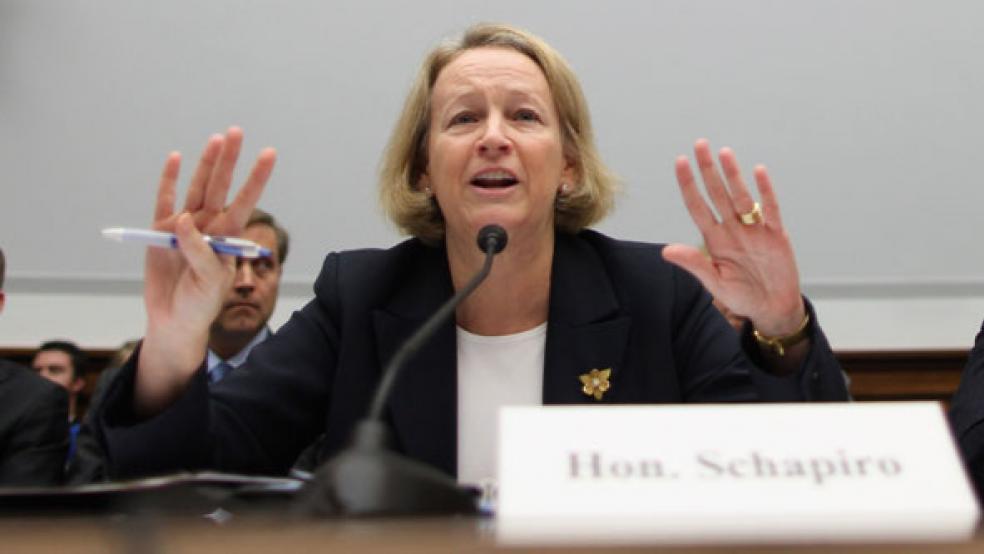The Securities and Exchange Commission needs fixing – fast. That’s the message of a new report issued by the U.S. Chamber of Commerce on Wednesday, which urged a major structural overhaul of the commission, including increasing the number of commissioners and limiting the number of mandated direct reports to the chairman.
The report, authored by Jonathan Katz, former SEC Secretary, also calls for an overhaul of the SEC’s rule-making process and enforcement procedures in an effort to restore it as the world’s premier financial services regulator. The 135-page “Roadmap for Transformation Reform” recommends expanding the commission from five to seven members and designating one commissioner as deputy chairman. That person would be responsible for leading day-to-day implementation of comprehensive review and reorganization. The agency should also start cost-benefit analysis at the earliest stages to allow the findings to guide the regulatory process leading to a rule, Katz said in the report.
In his 28-point list, Katz urged that the expanded seven-member commission be diversified and include at least one accountant, economist and attorney. The report said the financial crisis “laid bare many of the shortcomings of an agency that is grounded in an outdated view of the world’s financial markets.” The report calls for developing an in-depth training program on investigative techniques, and recommends that any cases more than 18 months old or based on a violation older than three years be “closed routinely” as a way to reduce backlog.
“Despite its more than 2,000 pages, the Dodd-Frank act did nothing to fundamentally reform the regulators charged with its implementation, not least the SEC,” said David Hirschmann, president and CEO of the Chamber’s Center for Capital Markets. “The SEC has made positive steps over the past several years, but incremental change will no longer do.” Created in response to the stock market crash of 1929, the SEC has failed to keep pace with rapidly changing markets, Hirschmann charged.
In 2009, the Chamber issued its first report to the SEC with 23 recommendations for incremental change. “By prejudging the outcome of this rule-making that something, anything, must be done as soon as possible, never mind the consequences, the commission runs the danger of skewing its analysis of any proposed regulatory changes,” said new SEC commission member Daniel Gallagher in his first public speech Wednesday at the Chamber of Commerce.
Gallagher, who has been on the job all of 26 days, expressed concern about any type of sweeping money-market fund reforms, claiming that the effects of last year’s rules implemented in Dodd-Frank are still unknown. "We cannot know what risks money-market funds pose unless ... we have a clearer understanding of the effects of the commission's 2010 money-market reforms," he said.
SEC Chairman Mary Schapiro and her agency have suffered a string of setbacks during the past two years. Most recently, they’ve been strongly criticized for their response to an inquiry into destruction of records. SEC spokesman John Nester defended the agency's actions in the wake of the financial crisis. "We can only bring actions if people violated the law,” he said a couple of months ago. “We've brought 72 enforcement actions against individuals and entities, 35 of whom were CEOs, CFOs and other corporate officers. We've ordered $1.1 billion in penalties."
The agency’s image has also been tarnished for failing to identify problems early and respond quickly to the financial crisis. They also missed the big one -- Bernie Madoff’s $65 billion Ponzi scheme -- even though they had been forewarned about the problem.
Despite this, Schapiro has asked Congress to approve an increased budget of $1.4 billion for 2012 to help implement nearly 100 new oversight duties under Dodd-Frank. Katz also called for increased funding and resources to the transformation process in addition to providing recommendations to enable the SEC to utilize its current resources better.
House Republicans have rejected Shapiro’s request and said that the agency should not get a budget boost until it uses its current resources to reform its internal operations and address management procedures. They have sought to keep the agency’s budget flat at $1.1 billion. Senate lawmakers, however, are seeking to boost the SEC’s budget to $1.4 billion. As lawmakers on Capitol Hill battle over a year-end spending bill in hopes of averting another possible government shutdown and extending the payroll tax cut, it’s unclear if the SEC will succeed in getting a budget increase next year or not.





